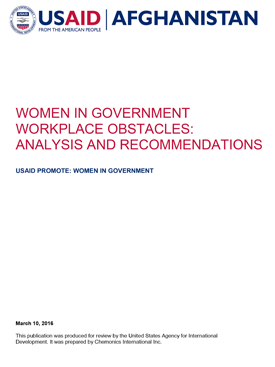Historically, women have been extremely underrepresented in the Afghan government, and as a result, they have had limited ability to shape policies and programs that directly affect them.

Workplace Obstacles for Women in Government in Afghanistan Workplace Obstacles: Analysis and Recommendations (2016) .
Project Report | March 10, 2016

This 2016 report analyzes the obstacles that limit women from working within the government, such as policy, regulations, culture, and adequate infrastructure. Further, it provides recommendations for establishing equitable work environments for women by integrating the perspectives of female and male government employees, students, and representatives of civil society organizations
Since the international intervention in Afghanistan post-2001, efforts to improve the lives of women have produced mixed results. Although Afghan women have the right to participate in public life and have gained improved access to education and health care, various obstacles still limit women’s advancement in society. Many women lack the concrete resources and education to obtain employment and face structural and sociocultural barriers to advance once inside the workplace. The United States Agency for International Development (USAID) Promote: Women in Government Workplace Obstacles: Analysis and Recommendations report analyzes the obstacles that limit women from working within the government, such as policy, regulations, culture, and adequate infrastructure. Further, it provides recommendations for establishing equitable work environments for women by integrating the perspectives of female and male government employees, students, and representatives of civil society organizations (CSO). The data presented in this report are based on findings from three survey questionnaires completed by 178 government employees, including 113 women and key informants from a cross-section of institutions. The baseline data are a starting point for understanding the obstacles women currently face to enter government institutions and to advance within ministries. By analyzing these multiple constraints, this report seeks to identify solutions for a rising generation of young women in government.
